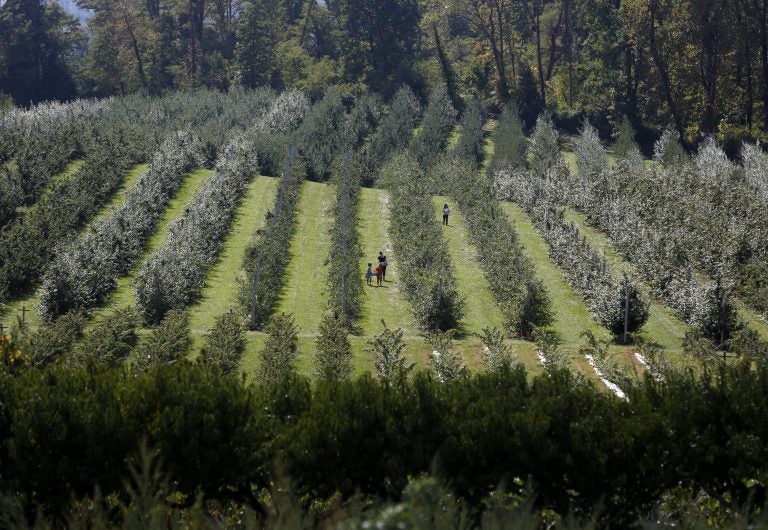N.J. invests public retirement funds in other states’ farms
N.J. pension officials are finalizing a $100 million stake in a private-equity fund to buy and lease farmland in West, Midwest and the Mississippi Delta.

People walk through the apple orchard at Alstede Farms in Chester, N.J., Wednesday, Sept. 27, 2017. (Seth Wenig/AP Photo)
This story originally appeared on NJ Spotlight.
—
New Jersey’s rich agricultural heritage accounts for its designation as the Garden State, but the state pension system is now looking to farms elsewhere in the country to boost its public-worker retirement funds.
State pension officials said yesterday they are finalizing an investment worth up to $100 million in a fund managed by Homestead Capital, a private-equity firm that specializes in generating returns from top-earning farms in the West, Midwest and Mississippi Delta regions.
The proposed investment will be the pension system’s first-ever stake in a fund that targets U.S.-based farming as a profitmaking strategy. Homestead Capital also fits in with the pension system’s new emphasis on socially conscious investing, pension officials said yesterday during a public meeting of the New Jersey State Investment Council.
“It’s a new space for us,” said Adam Liebtag, the panel’s chairman. “We’re not getting in at the height of the market. We’re getting in on the lower end and we’re going to try to get some returns over the long haul.”
New Jersey’s $70 billion public-employee pension system allowed its fund managers to buy stakes in private equity and other classes of so-called alternative investments starting in the early 2000s, after a major stock-market downturn that hit the system’s more conventional investments particularly hard. The idea was to diversify to help shield the pension system from fluctuations in the stock market; such investments can also help to boost overall returns.
Alternative investments perform well
For example, a consultant’s report released in 2016 determined that alternative investments generated more than 9 percent returns net of all fees over the previous five years. Those returns bested the pension system’s overall then-7.65 percent assumed rate of return for all its investment strategies over that same period.
More recently, fund managers have praised the performance of the alternative investments for helping to prevent bigger losses during the market’s most recent downturn as the pension system’s overall returns have settled in the red for the current fiscal year.
But the alternative investments — particularly stakes in hedge funds — have drawn criticism in part due to the high fees charged by the outside fund managers who run them. In fact, the pension system has been scaling back its stakes in hedge funds in recent years in response to those concerns.
Other types of alternative investments have also come under fire, including those connected to predatory payday lending companies and, more recently, a firm that played a role in the ongoing liquidation of Wayne-based Toys ‘R’ Us.
Earlier this year, the pension system launched a new investment policy that emphasizes so-called ESG investing, which stands for environmental, social and governance.
Emphasis on ‘sustainable farming’
According to due-diligence materials released before yesterday’s SIC meeting, Homestead Capital uses an investment process that emphasizes “labor, sustainable farming, and the environment.” The firm looks for farm operators who pay fair wages and adhere to best practices for worker health and safety. It also espouses “a particular focus on issues related to climate change and the scarcity of water.”
Pension officials also pointed to the firm’s financial acumen and the backgrounds of its top executives as reasons to go forward with the up to $100 million investment.
Co-founders Daniel Little and Gabe Santos are veteran portfolio managers who have family roots in agriculture. They’ve launched two prior farmland investment funds since 2014. (The pension system is seeking to buy a stake in the firm’s third fund, which is trying to raise an estimated $600 million from other investors in addition to New Jersey.)
Pension officials said that San Francisco-based Homestead Capital has found success by investing in a diverse range of crops across a number of different agricultural markets. When one crop stumbles, such as soybeans in the wake of President Donald Trump’s trade war with China, it doesn’t take down the entire fund.
Not expecting quick returns
The firm generally buys farms and leases them to skilled operators, using offices in Idaho, Illinois and Arkansas and has a “network of regional farmland managers that act as the boots on the ground in the local markets in which Homestead invests,” according to the due diligence materials.
Under terms that were reviewed yesterday by the investment council, the pension system will pay Homestead Capital a 1.5 percent management fee and a 15 percent performance fee during the life of the investment.
Pension officials also sought to temper expectations by warning such investments usually take years to turn profits as the initial focus is on acquiring properties and improving their farming operations. They also pointed to an overall conservative risk-versus-reward profile for the investment, making it fit in well with the broader diversification strategy for the pension system.
“This is not an investment that’s going to see a large return quickly,” Liebtag said. “We’re going to have to stomach, probably, some not (so) great interim reports and be in it for the long haul.
WHYY is your source for fact-based, in-depth journalism and information. As a nonprofit organization, we rely on financial support from readers like you. Please give today.




